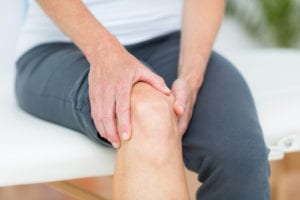Written by Taylor Woosley, Staff Writer. 8-week supplementation of 500 mg eggshell membrane decreased perceived pain scores to 2.98 ± 1.51 points, resulting in significantly reduced pain with respect to the control group (p < 0.014).
 Osteoarthritis (OA) is the most common chronic articular disease and is considered as progressive wear and tear of articular cartilage1. It is approximated that 250 million people over the world suffer from OA, with 8.9% of the adult population having clinically significant osteoarthritis of the knee (KOA)2. The knee is the largest synovial joint in humans and consists of bone structures, cartilage, ligaments, infrapatellar fat pad, and synovium3. Research has suggested that KOA is an inflammatory disease of the entire synovial joint, comprising both the mechanical degeneration of articular cartilage and the concomitant structural and functional change on the joint4.
Osteoarthritis (OA) is the most common chronic articular disease and is considered as progressive wear and tear of articular cartilage1. It is approximated that 250 million people over the world suffer from OA, with 8.9% of the adult population having clinically significant osteoarthritis of the knee (KOA)2. The knee is the largest synovial joint in humans and consists of bone structures, cartilage, ligaments, infrapatellar fat pad, and synovium3. Research has suggested that KOA is an inflammatory disease of the entire synovial joint, comprising both the mechanical degeneration of articular cartilage and the concomitant structural and functional change on the joint4.
Eggshell membrane (EM) has been previously studied because it is a naturally rich source of protein, elastin, collagen, glucosamine, chondroitin, and hyaluronic acid5. These bioactive compounds found in EM are used for the alleviation of joint discomfort6. It is known to reduce the expression of various pro-inflammatory cytokines, including the key mediators of inflammation interleukin-1 beta (IL-1β) and tumor necrosis factor-alpha (TNF-α)7.
Canovas et al. conducted a randomized, controlled, double-blind, single-center clinical trial to examine the efficacy of an eggshell membrane extract supplement on joint functionality and perceived pain. Subjects (n=80) were included if they were diagnosed with knee osteoarthritis and experienced chronic knee pain. Subjects were assigned to three groups: the low dose EM group (300 mg, n=24), high dose EM group (500 mg, n=25) or the control group (n=26). Supplementation was ingested once daily for the 8 weeks of intervention. Clinic visits were completed at the start of the study and at the end of week 8. Participants completed a dietary recall interview before starting supplementation and again at the end of the trial. Physical activity was measured using the Global Physical Activity Questionnaire (GPAQ).
The primary outcome was changes in knee pain which was assessed using a visual analog scale. Secondary outcomes included knee functional ability, quality of sleep, and quadricep muscle strength which was measured by isometric and isokinetic trials. Functional ability was evaluated using the Western Ontario and McMaster Universities Osteoarthritis (WOMAC) index. Muscle strength was obtained using a Biodex System 3 Dynamometer, while quality of sleep was determined by the Pittsburgh Sleep Quality Index (PSQI). Significant findings of the 8-week study are as follows:
- Compared to the control group, the high-dose EM group experienced significantly reduced perceived pain scores by the end of the study (p<0.014).
- Regarding pain perception using isokinetic and isometric trials, a significant decrease in pain was noted only for the high-dose group, accounting for 7.2, 10.04, and 47.42 N x m, respectively.
- Both the low-dose and high-dose group reported an increase in strength measured as PT, TWMR, and TW, with respect to baseline values.
- Quality of sleep improvement scores improved in the high-dose (1.6 points) and low-dose (0.46 points) group, indicating an improvement in the quality of sleep, particularly for the high-dose group.
Significant findings of the 8-week study show that supplementation of eggshell membrane effectively reduced perceived pain in subjects with KOA. A dose-dependent efficacy was noted in this trial, resulting in a higher reduction of perceived pain and improved sleep quality. Future research should continue to explore which dose of eggshell membrane offers the most therapeutic approach to KOA symptomology.
Source: Cánovas, Fernando, María Salud Abellán-Ruíz, Ana María García-Muñoz, Antonio Jesús Luque-Rubia, Desirée Victoria-Montesinos, Silvia Pérez-Piñero, Maravilla Sánchez-Macarro, and Francisco Javier López-Román. “Randomised Clinical Trial to Analyse the Efficacy of Eggshell Membrane to Improve Joint Functionality in Knee Osteoarthritis.” Nutrients 14, no. 11 (2022): 2340.
© 2022 by the authors. Licensee MDPI, Basel, Switzerland. This article is an open access article distributed under the terms and conditions of the Creative Commons Attribution (CC BY) license (https:// creativecommons.org/licenses/by/ 4.0/).
Click here to read the full text study.
Posted September 7, 2022.
Taylor Woosley studied biology at Purdue University before becoming a 2016 graduate of Columbia College Chicago with a major in Writing. She currently resides in Glen Ellyn, IL.
References:
- Perlman A, Fogerite SG, Glass O, et al. Efficacy and Safety of Massage for Osteoarthritis of the Knee: a Randomized Clinical Trial. J Gen Intern Med. Mar 2019;34(3):379-386. doi:10.1007/s11606-018-4763-5
- Kan HS, Chan PK, Chiu KY, et al. Non-surgical treatment of knee osteoarthritis. Hong Kong Med J. Apr 2019;25(2):127-133. doi:10.12809/hkmj187600
- Jang S, Lee K, Ju JH. Recent Updates of Diagnosis, Pathophysiology, and Treatment on Osteoarthritis of the Knee. Int J Mol Sci. Mar 5 2021;22(5)doi:10.3390/ijms22052619
- Primorac D, Molnar V, Rod E, et al. Knee Osteoarthritis: A Review of Pathogenesis and State-Of-The-Art Non-Operative Therapeutic Considerations. Genes (Basel). Jul 26 2020;11(8)doi:10.3390/genes11080854
- Hewlings S, Kalman D, Schneider LV. A Randomized, Double-Blind, Placebo-Controlled, Prospective Clinical Trial Evaluating Water-Soluble Chicken Eggshell Membrane for Improvement in Joint Health in Adults with Knee Osteoarthritis. J Med Food. Sep 2019;22(9):875-884. doi:10.1089/jmf.2019.0068
- Kiers JL, Bult JHF. Mildly Processed Natural Eggshell Membrane Alleviates Joint Pain Associated with Osteoarthritis of the Knee: A Randomized Double-Blind Placebo-Controlled Study. J Med Food. Mar 2021;24(3):292-298. doi:10.1089/jmf.2020.0034
- Wedekind KJ, Ruff KJ, Atwell CA, Evans JL, Bendele AM. Beneficial effects of natural eggshell membrane (NEM) on multiple indices of arthritis in collagen-induced arthritic rats. Modern rheumatology. 2017;27(5):838-848.
